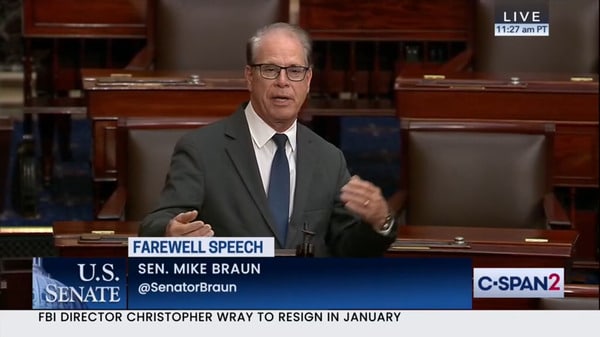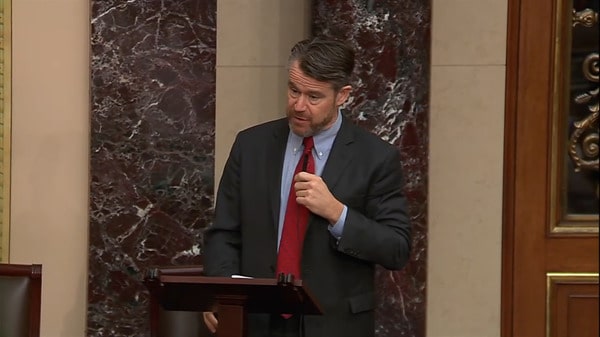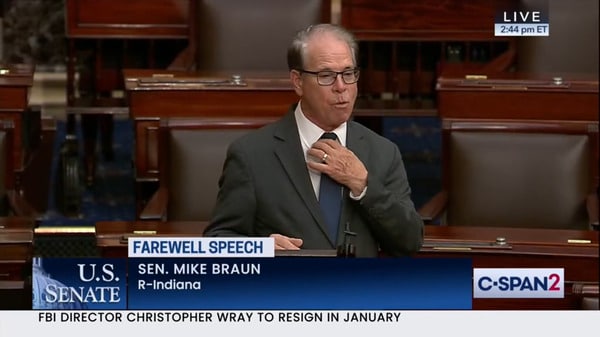
By Marilyn Odendahl
The Indiana Citizen
December 12, 2024
In his farewell speech to the U.S. Senate Wednesday, Mike Braun, Indiana governor-elect, recalled a memory from his earliest days on Capitol Hill.
He had attended his first State of the Union address in 2019 and was walking back to his Washington, D.C., residence. As he looked up at the star-lit sky with the moon hanging above the U.S. Capitol building, Braun said he asked himself, “How can you be so lucky?”
The Jasper Republican delivered his remarks on the Senate floor in a matter-of-fact manner. He touted his legislative accomplishments, offered some advice to incoming senators, praised his wife, Maureen, and their children and grandchildren and, as many politicians do, shared a few stories.
Throughout his speech, he referred several times to his experience running Meyer Distributing, a private company with 300 employees, and repeatedly contrasted the Senate with the “real world.”
Braun pointed to his early collaboration with U.S. Sen. Chris Coons, D-Delaware, to form the bipartisan Senate Climate Solutions Caucus and craft the Climate Solutions Act of 2021, which passed through the upper chamber on a 92-8 vote but stalled in the House. Braun said Coons, who had been searching across the aisle to find a Republican to work with on the issue of climate change, asked the freshman senator from Indiana if he was interested.
“He didn’t realize that he ran into somebody that had to think on his feet a lot in the real world, made decisions fairly quickly based upon what you really know,” Braun said of Coons. “I said, ‘I’ll do it.’”
Braun said he was then able to get six other Republican senators to join the caucus within a month.
“That, to me, was the first moment being here after just six months that said, if you do certain things, think out of the box, you can get a lot done,” Braun said.
In getting elected to the Senate in 2018, Braun surprised many by what he has called his “historic victory.” He defeated then U.S. Rep. Luke Messer and now Indiana Attorney General Todd Rokita in the Republican primary, capturing 41.2% of the vote and then upset incumbent Joe Donnelly, a Democrat, in the general election with 50.7% of the vote. Prior to the U.S. Senate, Braun was a member of his local school board for 10 years, then served three years in the Indiana House of Representatives.
Braun announced in 2022 he would forego running for reelection to the Senate in 2024 in order to run for Indiana governor. He won 39.5% of the vote in the Republican primary, topping a crowded field that included Lt. Gov. Suzanne Crouch and former Indiana Secretary of Commerce Brad Chambers. Then, he fended off Democrat Jennifer McCormick in an unexpectedly tight race to win the general election with 54.4% of the vote.
Braun’s gubernatorial inaugural is scheduled for Jan. 13 at the Indiana Statehouse.
“Hoosiers are some of the most good-hearted, hard-working people in the world, and it’s been my honor to serve you here,” Braun said in his farewell speech. “To all my colleagues here in the Senate, thank you for your friendship and the honor of serving alongside you in this esteemed body, not to mention all the precious memories I’ll take back to Indiana.”

Republican Todd Young, Indiana’s senior U.S. senator, also spoke on the Senate floor Wednesday, saying Braun had served with distinction by doing great work on behalf of the people of Indiana and providing leadership on multiple bills. Hoosiers elected Braun as their next governor because he will carry on Indiana’s “tradition of fiscal responsibility and effective management,” Young said.
“As we leave this chamber, I’ll have an opportunity to call you governor-elect, and then we can keep working together on veterans’ issues, on budgetary issues, on expanding health-care access to more people, on ensuring that Hoosiers and other across the country have access to affordable, quality housing near where the jobs are,” Young said.
Among his accomplishments, Braun included his work with U.S. Sen. Alex Padilla, D-California, on the Wounded Warriors Access Act, which was signed into law in 2023 and streamlined the claims process for veterans seeking benefits through the Veterans Administration. Also, he noted that his experience in lowering health insurance costs at his business helped him craft the Health Care PRICE Transparency Act, which he introduced in 2021 and 2023 to strong bipartisan support. While the bill never got to the Senate floor for a vote, he said it could serve as a template for similar legislation in the future.
Braun proudly recalled his opposition to the Biden administration’s COVID vaccine mandate. The Indiana senator introduced a disapproval resolution under the Congressional Review Act, which passed the Senate. In its 2022 opinion blocking the mandate, the U.S. Supreme Court called the bipartisan vote on Braun’s resolution “the most noteworthy action concerning the vaccine mandate by either House of Congress.”
“You can get results if you stick your neck out and take a little risk,” Braun said of the lesson he learned in the fight over the mandate.

During his speech, Braun wore a solid blue necktie, a departure from his typical open collar. He said he had tried to “bust the dress code” earlier in his tenure by walking into the Senate chamber tie-less but after nearly being tackled by another senator, he started keeping a tie in the cloak room so he could put it on before he walked into the chamber.
Braun advised his Senate colleagues to provide good customer service to their constituents by visiting and listening to them and helping them. Also, he warned his colleagues about the growing national debt and said that from building his own company, he learned “borrowing money from our kids and grandkids is not a business plan that’s going to work.”
In asserting the solution to the debt problem lies in the 10th Amendment to the U.S. Constitution, Braun may have indicated why he chose to leave the Senate for the governor’s office. The 10th Amendment provides that the states and the people hold any powers that are not given to the federal government.
“The states have been a laboratory for how you fix things,” Braun said. “That’s where the innovation is going to come from in the next decade.”
Colleen Steffen, executive editor of The Statehouse File at Franklin College, edited this article. She has worked as a feature writer and editor at newspapers in Indiana, Kentucky and Florida.
The Indiana Citizen is a nonpartisan, nonprofit platform dedicated to increasing the number of informed and engaged Hoosier citizens. We are operated by the Indiana Citizen Education Foundation, Inc., a 501(c)(3) public charity. For questions about the story, contact Marilyn Odendahl at marilyn.odendahl@indianacitizen.org.